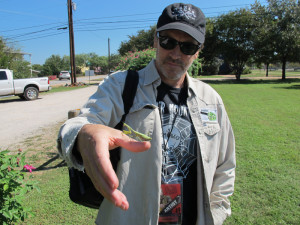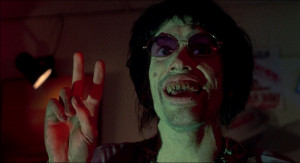
(Horror stars tend to be the polar opposite of their on screen persona, and none more so than Bill Moseley: the star of The Texas Chainsaw Massacre 2, House of 1000 Corpses, The Devil’s Rejects, Repo! The Genetic Opera, the remake of Night of the Living Dead, and dozens more, is infamously one of the nicest, softest-spoken members of the horror community. I had the chance to talk to him at the Housecore Horror 2015 festival about his career.)
Richard Whittaker: The first time I saw House of 1000 Corpses, it was at a midnight screening at the Leeds International Film festival, and it was immediately clear that Otis was a hit. What do you think it is about him, and what you were able to bring to the part, that really affected people?
Bill Moseley: I don’t really know. It’s something that Rob saw in me that I did not necessarily see in myself, which was a sinister, sexy quality. There’s that element that I never saw. I was more of a Chop Top guy. I always differentiated the two from centers of gravity. With Chop Top, it’s all up in the shoulders. There’s more of a sketchy feeling. There’s the coat hanger and the lighter, I’m scratching my head. It’s all shoulder stuff. With Otis, it’s all in the balls. It’s thumbs under the belt, sitting back, ‘fuck you.’ I didn’t really see that in myself, Rob did, which was very fortunate.
There’s also, Otis is crazy, but Otis also has family values. Otis is also kind of practical. That’s the difference between the Otis of House of 1000 Corpses and the Otis of The Devil’s Reject. Otis of House of 1000 Corpses is a little more spun, doing things like making poor Rainn Wilson into Fish-Boy, and having that crazy rap to the cheerleaders at the very beginning, about his brain covered with thick encrustations. But he’s almost an anti-hero in Devil’s Rejects. Actually, that’s the only time I’ve ever played the same character twice.
RW: You do have a habit of dying.
BM: But I’ve killed a lot more than have killed me. I’m way ahead in my body count.
RW: How much of the evolution of Otis came from you?
BM: Everything comes from Rob, in the sense that he wrote the screenplay, created the characters. What I try to do is fill in the blanks. Obviously, when you’re doing a screenplay, you’re doing a blue print, and after that it’s just boots on the ground, so to speak, of finding out how to make the reality more practical. But we really were pretty both attuned to Otis. I remember, for instance, a good example is there’s a scene where I drive up with Banjo and Sullivan, and we’re at this abandoned chicken farm, just outside of Lancaster, California, and we’re going to find some guns I’ve buried, but I’m really just going to kill them both. I pull up in the van, and then we have a long walking shot to where we have our big fight. Nothing was scripted, so Rob told me to say this line. “Why don’t you say, ‘is that your wife’s pussy stink on my gun?’” I say, “What?” he says, “Yeah,” and I say, “OK.” So I’m walking along, and I say, “Well, hoss, is that your wife’s pussy stink on my gun?” and I ad libbed, “Hope it don’t rust the barrel,” and then, “Is she into that, when you puke on her?” I was just goofing around.
The big difference was that, in House of 1000 Corpses, Rob was much more tight. He wanted you to say everything he had written. So there wasn’t as much improvising – at least for me. I think there was some for Sid Haig. But by the time we did Devil’s Rejects, it was looser, and there was more of a sense of collaboration, more of an organic sense to the film.

AC: You’re in the rare position of having three iconic roles. You’ve got Luigi Largo in Repo! The Genetic Opera, you’ve got Otis, and you’ve got Chop Top. Sometimes horror actors end up typecast, so Gunnar Hansen ended up with Leatherface over his shoulder all the time, but is it different for you knowing that, when you talk to people, they’ll bring up any one of those three? And which one comes up most?
BM: I’d say it’s a toss-up between Otis and Chop Top, but there are a lot of Luidi Largo fans out there. There are also a lot of Night of the Living Dead fans out there. That’s actually kind of a relief, that I have a lot of different characters, and some play better than other, depending on the time of year, where you are, and with whom you’re speaking.
The thing for me is it makes it easier to take different kinds of jobs, because I’m not chasing that elusive iconic part any more. I just like to work, and take what’s offered, and go for it. I realized, having done this so long, you just keep suiting up and showing up, you have fun with it, and yu never know if it’s going to turn into something cult classic-y. I’m always happy with my work.
RW: With indie horror, it come to a point where it feels like everybody knows everybody else, and from the outside it feels like a very cohesive scene. Does it feel the same as an actor, that you’re never more than three phone calls away from everyone?
BM: It’s true, especially in the horror genre because there are lots of horror conventions. I hang out with some of my famous horror colleagues, five or more times a year. We hang out, compare notes, talk about directors, jobs, what’s available, what we’ve done. We’re like dentists, but we kill people instead of drill people. It’s a lot of fun to hang out, but it ends up being a real community.
RW: That includes knowing a lot of younger filmmakers like Adam Wingard.
BM: Adam, and Lucky McKee is another one. I guess, back in the day, Adam and Evan (Katz) were back in Birmingham, Alabama, They were young filmmakers, and they wrote and directed Homesick, and were fans of mine. I’m trying to remember if it was before or after House of a Thousand Corpses, but it was right around that time. They wanted me, and they also hired Tiffany Scheppis, and so I came down, and they were very young, but it was just what I like so much. It was a very heartfelt effort, and obviously Adam is a very talented filmmaker.
Adam used to live not too far from me in Los Angeles, and one night a homeless guy had broken into my apartment building. It was an easy break-in, because the front door you could jimmy with a knife or even a credit card. So this homeless guy had gotten in, and all the ladies in the building had freaked out. I yelled at him, and he calmly walked out of the building. I wanted to chase him down and – I don’t know if I was going to wrestle him, or hold him for the police, or do something dramatic. The guy was walking away, and I was going after him. All of a sudden, Adam Wingard walks by, and he goes, “Hey, man,” and I go, “Hey, dude, I’m chasing that guy,” and he says, “Can I come along?” and I say, “Yeah, absolutely.”
So we’re doing this slow chase. We’re walking, and he’s walking ahead of us, and I’m on the phone to the cops, and the cops are saying, “Do not engage this guy, leave him alone, get out of there.” Because they’d determined he hadn’t killed anybody or hurt anybody, so just let him go.
That was the second to last time I saw Adam, but I did see him at a screening of The Guest, which I really love.
(a shorter version of this interview previously ran at Austinchronicle.com